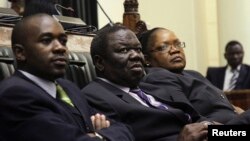HARARE, ZIMBABWE —
In Zimbabwe, some pro-democracy groups have taken the government to court, saying the planned date of March 16 for a constitutional referendum does not give Zimbabweans enough time to examine the new charter. The civic organizations say they want the referendum postponed.
Zimbabwe's main political parties - ZANU-PF and the Movement for Democratic Change [MDC] - both support the new charter, and agreed a referendum on it should take place March 16.
But Lovemore Madhuku, who heads the National Constitutional Assembly [NCA], a coalition of pro-democracy groups, said Tuesday that Zimbabweans need more time to analyze their proposed new constitution.
“We demand that the official draft [constitution] be made available as soon as possible to all the people in all the major languages. We need a minimum of two months from the date they proclaimed the referendum to the time people vote,” said Madhuku.
Focus on new constitution
The NCA teamed up with the opposition, then led by current Prime Minister Morgan Tsvangirai’s MDC party, to defeat a different proposed constitution in 2000. This time, however, Tsvangirai and the MDC are urging Zimbabweans to vote in favor of the new constitution.
On Monday, when the NCA groups indicated that they would seek to postpone the constitutional referendum, Tsvangirai had some comments.
“This constitution has been a people-driven process. So as far as making the consultation, people have made inputs. People know what the constitution is," said Tsvangirai. "And what they are waiting [for] is: 'Where is the constitution?' Now the constitution is available, you are saying give them more time again to consider something that they have been waiting for all these four years?”
A new constitution in Zimbabwe is critical for African leaders, who want it adopted ahead of elections expected around July that would end the country’s current coalition government.
Regional leaders forced President Robert Mugabe of ZANU-PF to form a coalition with Tsvangirai's MDC following the disputed and violent 2008 elections.
The draft constitution reduces presidential powers and sets a maximum of two terms for the president. It also has provisions strengthening state institutions such as the cabinet, parliament and judiciary.
Zimbabwe's main political parties - ZANU-PF and the Movement for Democratic Change [MDC] - both support the new charter, and agreed a referendum on it should take place March 16.
But Lovemore Madhuku, who heads the National Constitutional Assembly [NCA], a coalition of pro-democracy groups, said Tuesday that Zimbabweans need more time to analyze their proposed new constitution.
“We demand that the official draft [constitution] be made available as soon as possible to all the people in all the major languages. We need a minimum of two months from the date they proclaimed the referendum to the time people vote,” said Madhuku.
Focus on new constitution
The NCA teamed up with the opposition, then led by current Prime Minister Morgan Tsvangirai’s MDC party, to defeat a different proposed constitution in 2000. This time, however, Tsvangirai and the MDC are urging Zimbabweans to vote in favor of the new constitution.
On Monday, when the NCA groups indicated that they would seek to postpone the constitutional referendum, Tsvangirai had some comments.
“This constitution has been a people-driven process. So as far as making the consultation, people have made inputs. People know what the constitution is," said Tsvangirai. "And what they are waiting [for] is: 'Where is the constitution?' Now the constitution is available, you are saying give them more time again to consider something that they have been waiting for all these four years?”
A new constitution in Zimbabwe is critical for African leaders, who want it adopted ahead of elections expected around July that would end the country’s current coalition government.
Regional leaders forced President Robert Mugabe of ZANU-PF to form a coalition with Tsvangirai's MDC following the disputed and violent 2008 elections.
The draft constitution reduces presidential powers and sets a maximum of two terms for the president. It also has provisions strengthening state institutions such as the cabinet, parliament and judiciary.




